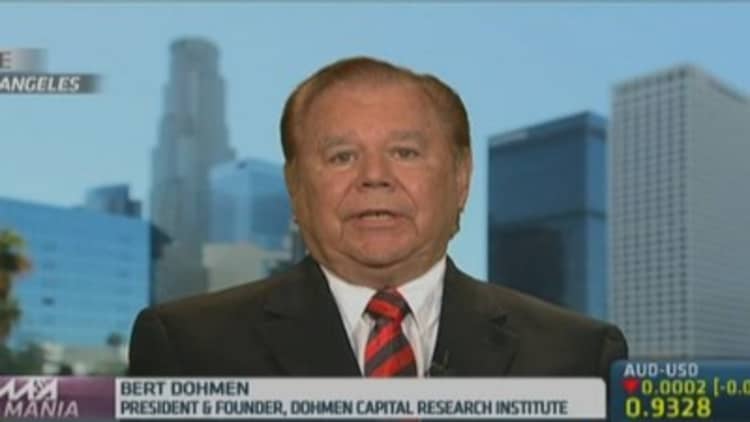
Global merger & acquisition (M&A) activity has reached fever pitch this year, matching levels not seen since 2008. One analyst told CNBC he was concerned that the surge could indicate that bubbles are forming in the market.
According to data provider Dealogic, global M&A volume reached $804.5 billion in the first quarter of 2014, up 23 percent on the same period a year before, marking the highest level for the first quarter since 2008.
"M&A is getting a little crazy now. The first three months of this year we've had the highest M&A since 2008. Now does anyone remember what happened in 2008, wasn't there some kind of a global crisis? When you reach a peak in M&A it's usually a peak in the stock market," said Bert Dohmen, president and founder of Los Angeles-based Dohmen Capital Research Institute.
Read MoreGetting hostile—unfriendly M&A hits pre-crash high
In a separate report, Dealogic found that hostile merger and acquisition (M&A) activity around the globe has reached a seven-year high, at levels not seen since before the global financial crash of 2008.
Hostile takeovers occur when an acquiring company does not strike an agreement with the target company's management, instead going directly to shareholders with a deal, or replacing management.
Year-to-date hostile activity stands at $273.4 billion, according to Dealogic. Last year's figure for the same year-to-date period stood at just $70.6 billion. This year's performance so far looks to be the highest since 2007's figure of $377.4 billion.
M&A megadeals
The data come after a number of high-profile M&A megadeals in 2014. This week, headlines focused on U.K. pharmaceutical AstraZeneca's rejection of a revised £69 billion ($116 billion) acquisition bid from rival Pfizer.
On Monday, AstraZeneca said the U.S. company's "final" offer was inadequate and would present significant risks for shareholders, however, some shareholders have expressed disapproval of the deal rejection.
AstraZeneca Chair: Shareholders can 'vote me away'
Meanwhile, in the U.S., multinational communications corporation AT&T proposed to buy satellite TV provider DirecTV for $48.5 billion.
Other bumper deals that have hit the headlines this year include Facebook's $19 billion acquisition of WhatsApp in February, while in Europe a deal between GlaxoSmithKline and Novartis involved trading 11 billion pounds worth of assets ($18.5 billion).
But Dohmen warned that there are worrying parallels between the recent surge in M&A activity and the similar build-ups seen in 1999-2000, and in 2007-2008, which preceded market crashes.
"It's too exuberant. When companies have too much cash, they do not spend it wisely. Companies don't care about value anymore, all they care about making is deals," he added.
Read MoreJamie Dinan: Look to M&A activity
Furthermore, Dohmen warned that the frenzied pace of M&A activity this year is an indicator of bubbles in the economy. He highlighted stretched valuations on the - a U.S. index consisting of small-cap stocks - where the price to earnings ratio is an average of 73, he said, compared to the Nasdaq's 35 and the 17.
"Small caps are as overvalued as we've seen at other monumental market tops. They have just taken their first big hit, and this will eventually spread to areas perceived as safe havens, like the utilities. When you've been in the business for as long as I have you recognize the signs," he added.
But according to Keith Pogson, managing partner of financial services at Ernst & Young's Hong Kong office, the recent surge in M&A was not necessarily a sign that the market has topped out.
Read MorePharma M&A is back—Can it cure the sector's ills?
Pogson said although transaction volumes were undoubtedly huge, it was important to note that these numbers are somewhat skewed by some of the mega deals being made.
"I'm not sure we're at apocalypse yet, this is almost a catching up of some of the activity that hasn't been going on for a while because market circumstances are in a better place," said Pogson.
"It's just that at this point in time financing is strong, financial markets have recovered more than they had before, appetite is stronger and bond yields are low, so doing any form of leveraged debt is cheaper now than it has been," he said.
Read MoreAstraZeneca rejects Pfizer's 'final' bid
Pogson added that a shift in the drivers for M&A deals is also contributing to the recent acceleration.
"People are acquiring for different reasons than they were historically. Historically we saw a lot of horizontal and vertical integration now we're seeing people acquiring intellectual property, that innovation and ideas they can add to their business," he added.



